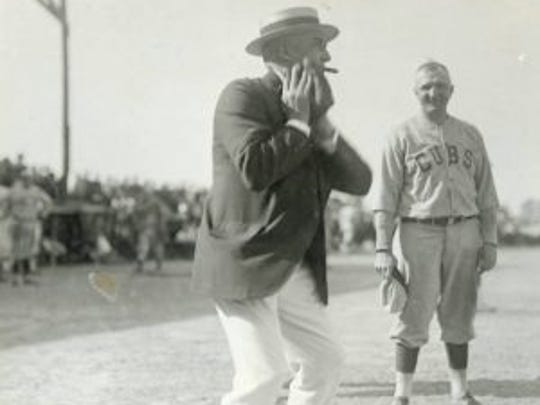Shoeless Joe is great, but another of Kinsella's books, The Iowa Baseball Confederacy, is even better. Like most of Kinsella's works, the book is heavy on baseball, Iowa, and magical realism. The premise is basically that the 1908 Chicago Cubs played a multi-week, 2,500-plus-inning exhibition game against an amateur team from Big Inning, Iowa, but the protagonist of the story is the only one who knows the game occurred and is obsessed with proving it. He winds up going back in time to observe and participate in the game himself. Besides Cubs legends like Tinker, Evers, Chance, and Mordecai "Three Finger" Brown, the game also features such players as a giant mystical Native American, the statue of an angel from a nearby cemetery, and even Teddy Roosevelt, who stops by but strikes out.
With that in mind, a couple years ago I was perusing some president-and-baseball trivia when I came across a vague statement about how Warren G. Harding once invited a Major League Baseball team to play in his hometown. I forwarded that bit of information to my dad, also a Kinsella fan, with the comment, "Haha! I bet the Chicago Cubs played an exhibition game in Marion, Ohio!"
Then I dug into it a bit and learned that is exactly what happened.
Harding wasn't actually the one who invited the team--the idea was the brainchild of an advertising executive named Albert Lasker, who also happened to be both a consultant to Harding's presidential campaign and the majority owner of the Chicago Cubs. His plan was to hold an exhibition game in Marion between two Major League teams. However, it seems the idea proved too political for the other Major League clubs, so the Cubs wound up playing against Marion's semi-pro team, the Kerrigan Tailors. The game would bring publicity to Harding's campaign and would help reinforce the idea that Harding was a down-home guy who loved America's pastime just as much as the average Joe.
The game, held in Marion's Lincoln Park on September 3, 1920, was understandably packed. The 700 grandstand seats easily sold out, and another 5,000 watched from the sidelines.
Harding himself pitched to open the game, "striking out" Cubs right fielder Max Flack. According to an article from the Harding Home Presidential Site:
The first pitch was called a strike by "a charitable umpire." The next pitch ended up "about four feet outside the plate and within a foot of the ground" with the final pitch carrying out of Flack's reach.
 |
| Warren G. Harding, showing excellent form. --From archives of the Harding Home Presidential Site |
The Cubs wound up beating the Tailors 3-1. That score isn't as lopsided as one would expect, even with professional players pitching for both teams. I'm sure the Cubs weren't trying their hardest.
The game did not take weeks or a couple thousand innings; just nine innings played over the course of an afternoon. There were no statues making diving catches in the outfield. But it has to have been the only game in history in which one team's starting pitcher was a future president and the other's was named after a former president, and that's saying something.
